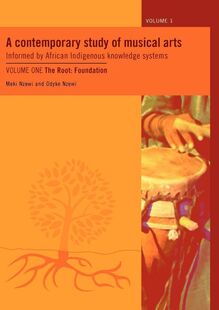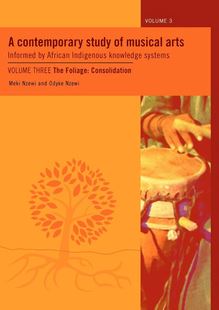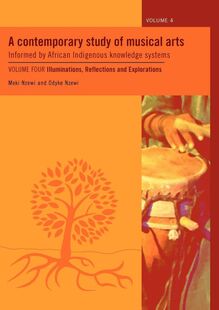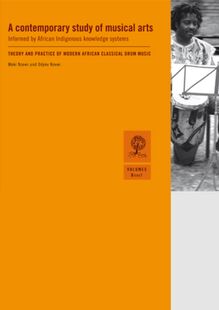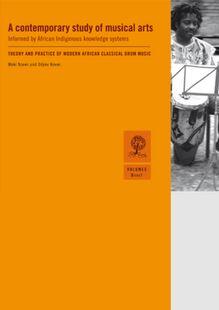Publié par
Date de parution
22 mars 2012
Nombre de lectures
3
Langue
English
Poids de l'ouvrage
2 Mo
Volume 4 – Illuminations, reflections and explorationsModern literacy education in African music has hitherto focused more on observed context studies. The philosophical rooting and the psychological and therapeutic force that ground African indigenous musical arts have not been much discerned or integrated. Much needed in contemporary education, then, are integrative studies and literature materials that represent the intellectual base of the knowledge owners and creators, and which will ensure cognitive understanding of the indigenous musical arts systems of Africa.There is as yet no comprehensive, learner-centred book that fosters African indigenous knowledge perspectives and rationalisation about the musical arts. The concern over the years has been for the production of research-informed books for modern, systematic education in African musical arts that derive in essence from the original African intellectual perspectives about the sense and meaning of music – indigenous to contemporary.The five volumes of the musical arts study series derive from 36 years of research and analytical studies in African musical arts. The volumes address the pressing need for learning texts informed by the indigenous African musical arts systems that target tertiary education. The texts incorporate knowledge of conventional European classical music as they relate to the unique features of African musical arts thinking and theoretical content. The contemporary African musical arts specialist needs secure grounding in his/her own human-cultural knowledge authority in order to contribute with original intellectual integrity to African as well as global scholarship discourse and knowledge creation.
Voir
ACONTEMPORARYSTUDYOFMUSICALARTS INFORMEDBYAFRICANINDIGENOUSKNOWLEDGESYSTEMS
VOLUME4:
ILLUMINATIONS,REFLECTIONSANDEXPLORATIONS
Indigenous musical arts in Africa is definitely not an indulgence of sonic euphoria
Meki Nzewi
Ciimda series
A contemporary study of musical arts informed by African indigenous knowledge systems Volume 4
Author: Meki Nzewi Music typesetting & illustrations: Odyke Nzewi Reviewer and editor: Christopher Walton Copy editor: Hester Honey Proofreading: Chérie M. Vermaak Book design and typesetting: Janco Yspeert
ISBN 978-1-920051-65-5
© 2007 Centre for Indigenous Instrumental African Music and Dance (Ciimda) First edition, first impression All rights reserved
Production management: Compress www.compress.co.za
CONTENTS
FOREWORD
PART 1:PHILOSOPHICALILLUMINATIONS1. THE LOREOF LIFE 2. P A HILOSOPHY ANDAESTHETICS IN FRICAN MUSICAL ARTS 3. T , HE JUNCTIONSPACE AND HUMANNINGOF MUSIC 4. Y , OUR BLOODIN ME MY BLOOD IN YOU
PART 2:THEORETICALEXPLORATIONS5. THEORYANDCOGNITIVERESEARCHOFAFRICANMUSICALARTS6. ANALYTICALPROCEDUREINAFRICANMUSIC:SOUNDINGTRADITIONALSOLOAESTHETIC
PART 3:INDIGENOUSAFRICANDRAMATICTHEATRE7. TA – HE INDIGENOUSFRICAN CONCEPT AND PRACTICE OF DRAMA THE SPIRIT MANIFEST THEATRE P I: C , – ART ONCEPT CATEGORIES AND ROLES ETHNOLOGICAL PERSPECTIVES P II: S : ART PIRIT MANIFEST DRAMA REORIENTATION FOR CONTEMPORARY CONTINUUM
PART 4:ISSUESINCONTEMPORARYEDUCATION8. MY KNOWLEDGEINHERITANCE IS AUTHENTIC AND CONTEMPORANEOUSLY RELEVANT 9. MNA H & M A – : USICAL ARTSFRICA A EDUCATION IN ERBST EKI DEBATE NRI ZEWI 10. MUSICEDUCATIONINTHE21STCENTURY–CHALLENGESANDCONSIDERATIONS: C D HATS EVROOP 11. DANCE INMUSICAL ARTS EDUCATION
PART 5:REFLECTIONSONSCIENCEANDTECHNOLOGY12. AFRICANMUSICALARTS–MANAGINGUNIQUENESSWITHINTECHNODECULTURING13. E: A FFECTIVE TECHNOLOGYFOR RECORDING FRICAN INDIGENOUS MUSIC INSTRUMENTS ODYKENZEWI
PART 6:POSTSCRIPT14. B A ACKDROP TOFRICAN SOCIETYMUSIC AND HEALING IN INDIGENOUS
A : APPENDIX UDIO MUSICILLUSTRATIONS AND SAMPLES
V
1 3 23 39 56
67 69 95
117 119 119 139
155 157 172
199 207
219 221
278
283 285
291
VOLUME 4
FOREWORD
This volume ofIlluminations, reflections and explorationsconcerning African indigenous music, dance, drama and humanness adopts multiple perspectives to examine and discuss the same key ideas, themes and issues in various chapters. This considered approach con-forms to the African adage that says “You cannot grasp the full artistry, meaning, grandeur and mysteries of a performing spirit manifest by rooting your viewpoint on one observa-tional spot or analytical perspective.” It is most illuminating to deliberate about and argue an object of perception or study by changing the position for contemplation and, therefore, interpretative perspectives, which is what disciplinary scholarship is about most of the time.African creative theory is marked by the performance principle and theory of cyclic de-velopment of the structural inside of a known framework or viewpoint. New insights and potent energies are generated when the same theme (musical arts or otherwise) recurs in varying contexts and dimensions. In indigenous Africa, the musical arts become a subtle but prodigious supernormal force that transacts the issues of life, health and death. At the indigenous musical arts sites, hu-man and societal systems are queried, negotiated and sometimes effectuated musically. The musical arts generate a conducive, spiritual disposition for engaging with sensitive issues of life. It is practicable to rationalize the same aspiration into the philosophy and methodology of contemporary musical arts study, performance and discourse. Some of the arguments and opinions in this volume are frank, forthright – a key attribute of indigenous African musi-cianship, querying societal issues and trends as the outspoken conscience of the musician’s society or human constituency. The indigenous African conceptualization is holistic – the cosmological thought system starts by envisioning, perceiving and construing the whole, the unity. Some of the articles in this Volume have adopted holistic lenses in examining and interpreting specific issues and manifes-tations in African indigenous musical arts. Unity or the vision of the whole is the foundation on which to construct, distinguish and foreground the constituent elements at the sequenced levels of subunits or group coherence. Finally the nature of the isolated component makes sense in the context or knowledge of the telescoped levels of the overarching cosmos. Hence, nosingle individual is deemed or rated greater than the group. In the social-political dimension, the society as a whole is given the first consideration, thereafter, in telescopic order of importance, the member communities, the compounds, the nuclear families and, finally, the individuals. In the musical arts, ensemble or group play is heard (type/style), reasoned (context/objective) and assessed (compositional/artistic merits) first, as a holistic construct, before apportioning merit or demerit to constituent sections or parts. The group play is thus more important than any solo play or individual contribution. The musical arts cannot make African sense and mean-ing when discussed or experienced only as sonic or choreographic or dramatic abstraction, that is, as a non-socially/politically/medically/religiously ballasted experience. The musical arts indigenously recreated and performed the African cosmos. That was before the philosophies of
vi
ACONTEMPORARYSTUDYOFMUSICALARTS– VOLUME4
individualism and isolationism and exogenous religious, societal and economic doctrines came to corrupt and to diverge the modal mind of Africans, resulting in the contemporary social schisms, insecurity of the individual and poverty of mind and means. In the original Africa, aperson was not allowed to be poor and isolated when the family, the compound group or the com-munity, in that telescoped order of responsibility, had the shared wherewithal for sustenance. This volume ofAcontemporary study of musical artsis a collection of essays that dis-cuss the musical arts of Africa from different but not mutually exclusive scholarship per-spectives:Philosophical reflections, Theoretical issues, The indigenous concept of drama, Issues in contemporary education, Review of scienceand technologyand an anecdotal Postscript. Certain central themes are argued from varied philosophical perspectives and analytical introspections in different essays – according to the principle of recycling to accrue or imprint depth of essence – in order to underline their centrality in African musi-cal arts discourse. The perspectives argued in the essays are infused with strong breaths of African ancestral sensitization and loyalty, and may in all likelihood stagger or even upset purist or resolute hegemonic scholars. The recycling discursive style reflects the indigenous regenerative philosophy of growth that marks the manifestations of the indigenous African world-view and intellectual-material civilization. A cyclic developmental ideology characterizes African compositional or creative ide-ology and innovative theory. Exponential restatement or recycling imprints the essentialnature of a theme in the mind while generating fresh illumination that affords multi-perspective enlightenment. Recycling then becomes a pedagogic principle that clarifies as well as consolidates knowledge. The creative philosophy of advancing through recycling does not radicalize the base and is derived from Africa’s indigenous scientific study of hu-man and non-human models of reality in nature. Every human person is a fresh, recycled version of the basic human theme in physical features as well as animating nature, and the new is expected to be a developmental index of the parent. Hence, in indigenous Africa, the cherished offspring are those that advance the intellectual and material stature of parents. In musical arts the practice, as well as impact, of cyclic growth regenerates and thereby recharges the innate potent or aesthetic energy of a significant musical theme or structure. Recycling is not repetition, but rather circumscribed developmental reworking that produces new insights, enrichment, intensity, and thereby growth in effect and affect. The recycling of ideas in this discourse may, therefore, contradict the cosmopolitan regimen for scholar-ship. In the African musical arts, scholarship that relies solely on Northern Hemisphericprescriptions and procedures will obscure rather than elucidate the unique humanly direct-ed, theoretical and philosophical groundings of indigenous African musical arts intellect. Some of the most glorified inventions or products of modern human genius are continu-ally ending up as diabolic, and become landmarks in human and environmental tragedies some few years after being celebrated as remarkable innovations. That is because the con-temporary inventive mind de-emphasizes salubrious human interests in the conception, configuration, production, promotion and consumption of knowledge outputs. The old Af-rican philosophy and practice of innovation, on the other hand, continues to redeem some of the traumatic fallout of modern scientific-technological wizardry. The African philosophy of innovation and change advocates a humanly rationalized approach to the modification, transformation and advancement of every stage of knowledge conceptualization, practice
FOREWORD
or product. It also prescribes reflective, circumspect accommodation of strange ideas from within and outside the culture, in order to obviate whatever could injure or undermine cardinal humanistic principles of life: “A person who recklessly rushes into battle (non-predictable or strange encounters) does not realize that it could entail death.” Circumspec-tion does not imply a lack of spirit of adventure. After all, to ensure sublime living, the indigenous African had to investigate and come to terms with the challenges of the mysteri-ous environmental and spiritual worlds. Because of this, every innovation in indigenous knowledge used to be rationalized and adopted primarily on the cardinal principle that it would engender community wellbeing, values and virtues. Globally, the impact of most modern inventions is marked by the depletion or trivializa-tion of human values and virtues. The cautious indigenous approach to development could give the false impression of a static state, or a slow rate of advancing existing systems and practices. And yet it is instructive that the grand force of a deep moving sea often fronts a deceptively calm surface; buoyant foliage does not signify robust roots. Such reflectivedevelopmental philosophy has characterized the advancement of African musical artscreativity and practice over generations of humanly rationalized growth in scientific, tech-nological and humane grounding. The experience, in contemporary Africa, of recklessly embracing every deleterious exogenous knowledge product, ironically identified with being developed, albeit inhumanly, contradicts the original African philosophy of cautious advance-ment to consolidate humanness. The results have been the destruction of mental integrity and sobriety, salubrious spiritual-physiological health, and stable polity in modern Africa. The paucity of intellectual originality that besets the average contemporary African mind in state politics, religion, education, economy and human-cultural imaging is of grave concern. Contemporary interaction in global scholarship is riven by politics concerning who cre-ates the knowledge inventions and discourse that should be acceptable for dissemination and promotion by organs privileged to control the processes of dissemination in any form. Knowledge drives global political systems. An understanding of the political schema, as played out in contemporary, as opposed to indigenous, experience, would place the issues of literacy and the performance study of the musical arts in Africa in perspective within the world context. Hence a brief analogy on the African experiences of the politics of Colonial-ism in Africa would introduce the essays in this volume from an African perspective. Colonialism, spear-headed by mind-warping foreign religions, initially destabilized Af-rican ethnic autonomies. It applied a policy of divide-to-control that effectively but invidi-ously invalidated homogenous human-cultural groups for easy religious, political, mental and economic subjugation, as well as exploitation. Next, to establish political-economic hegemony and legitimize the intervention that destabilized the political autonomy of au-tochthonous African groups, it became expedient to amalgamate the already contradicted human groups and cultural systems into concocted Statehoods. The stratagem resulted in the arbitrary invention of amorphous African nations. In order to subvert the struggle by the virtual African nations to forge, albeit ambiguous, political and mental independence, Colonialism once again changed its tactics to a policy of remote-controlled disunity in order to consolidate external control. The vaguely independent modern African nations thus remain subtly subverted by colonial doctrines that, mentally and materially, systemati-cally engineer and sustain the internecine wars for ethnic re-emancipation now endemic
vii
viii
ACONTEMPORARYSTUDYOFMUSICALARTS– VOLUME4
in Africa. The policy of shifting goal posts of course enables the systematic knowledge and material expropriation of Africa. The relevance of this excursive reflection is to ponder the continued schemes that ingeniously service capitalist and scholarship agendas. It is hoped that the alarming majority of bemused contemporary Africans would realize that, mentally, they are perpetually in conflict and unoriginal, albeit euphoric, while being mere humoured consumers of extraneous knowledge productions. The systemic state of anomy that is disabling mental-cultural emancipation among Afri-can peoples is reflected in the exogenously oriented philosophy, methodology and substance of the contemporary education system. Complying with a remote-controlled status quo ensures that Africans do not demonstrate originality in the conduct of their polity. As such, they are scarcely ever challenged to discern and advance their profound knowledge lore and noble human-cultural systems into contemporaneous sustainability. The early metropolitan scholarship politics of the era of colonial conquest advocated and practised the study of cultural enclaves. As hegemony over the interpretation of African in-digenous knowledge systems and human-ecological practices became consolidated, colonialist scholarship shifted to discussing “African music” as a homogenous system. In recent times, with independent-minded African scholars emerging and joining the ranks of world scholars in African musical arts studies, colonialist scholarship dictation has reverted to the political dogma that the study and discourse of African musical arts should eschew focussing on com-mon conceptual-theoretical frameworks. Thus the persisting but subtle colonial agenda in governance, as well as in the politics of scholarship, distracts African intellectuals from focus-ing on regaining the authority to discern and explicate their prodigious indigenous knowledge 1 legacy. And the average African ‘“mimic men” posing as scholars’ (Agawu, 2003:188) remain compliant clones of Northern Hemispheric scholarship prescripts and governance. The average member of the contemporary African elite in politics or in a profession who snatches marginal self-centred benefit easily remains a compliant and remote-controlled mental deviant, betray-ing both ancestry and posterity without shame or compunction while wallowing in tokenistic recognition. Originality is gravely lacking among most African elites disorientated by the privileges of leadership in the Statehood, academic, economic, educational and religious af-fairs of the contemporary African, exogenous, nation-state dispensation. The offerings in this volume on the philosophy, human sense and meaning, as well as the creative procedure that ground African musical arts knowledge systems span and tel-escope indigenous and contemporaneous theorizations. Some of the chapters are revised version of articles delivered at conferences and symposia. Three of the articles, “The junc-tion of music, space and humanning”, “Theory and cognitive research of African musical arts”, and “Analytical procedure in African music”, initially were considered for publication in journals/books. They were withdrawn from publication when editors and/or reviewers started constraining me to rewrite them to conform to exogenous and untenable scholarship impositions on African indigenous knowledge systems. I remain determined to uphold the contemporaneous validity, as well as intellectual authority, of Africa’s indigenous musical arts philosophy and theoretical procedure. African musical arts comprise a system of applied knowledge. The conceptualizations and theory are critically grounded in other societal and humanistic imperatives. The sonic,
1
See Agawu, Kofi. 2003.Representing African music. New York and London: Routledge.
FOREWORD
choreographic and dramatic logic and grammar of the musical arts of indigenous Africa cannot be genuinely discussed in isolation from their societal context of conceptualiza-tion and conformation. Musical arts scholars who genuinely represent Africa’s indigenous knowledge systems, and who ignore the ancestral canons of knowledge perjure their herit-age and their sense of self. I am strongly convinced about the pedagogic efficacy of the indigenous narrative mode of knowledge dissemination in contemporary education and scholarship. Hence I have involved a narrative scholarship style to varying extent, in discussing philosophical, theoretical and scientific issues in the following titles: “The lore of life”, “Philosophy and aesthetics”, “Your blood in me” and “My knowledge inheritance is authentic”. “Analytical procedure in African music” and “Theory and cognitive research of African musical arts” are musicological dis-courses that position original African creative theory. “The indigenous African concept and practice of drama” explicates the philosophy and intention of African composite musical arts theatre, and provides a sample scenario of contemporary advancement of applied indigenous mystery drama. The chapter on dance, “Dance in musical arts education”, itemizes the mean-ing and features of indigenous conceptualizations concerning the dance component of the musical arts, and how they could be rationalized into humane classroom education in the cultural arts. “The junction of music, space and humanning” critiques attitudinal dispositions in musical arts scholarship from the perspective of the indigenous African rationale that made the musical arts a societal institution. “African musical arts – managing uniqueness within techno-deculturing” is an extensive chapter that reflects on the deleterious aspects of tech-nology as they impact on humane sensibility, dispositions and aspirations, particularly in the African human environment, from the perspective of the musical arts. st The volume includes the chapters: “Music education in the 21 Century – challenges and considerations” by Chats Devroop, “Effective technology for recording African indigenous music instruments”, a preliminary discussion by Odyke Nzewi, and “Musical arts education in Africa – a debate” by Anri Herbst and Meki Nzewi. A brief postscript, “Backdrop to music and healing in indigenous African society” reflects on the essentiality of music in healing. The chapter, “The indigenous African concept and practice of drama – the spirit manifest theatre” and “Dance in musical arts education” are the outcome of research projects con-ducted in the Ama Dialog Foundation in Nigeria on the contemporary advancement of indigenous musical arts theatre of Africa. The other chapters have derived from researches conducted at the University of Pretoria and the Centre for Indigenous African Instrumental Music and Dance Practices (CIIMDA) based in Pretoria. I appreciate the contributions of various colleagues in African musical arts scholarship whose critical reviews and opinions, positive and negative, shaped or affirmed the gestation of my views and positions responsibly expressed in the various chapters. The CD accompanying the volume contains the four flute poems analysed in Chapter 6, th “Analytical procedure in African music”, anukomcompartmentpiece from the 6 music (movement) of theukomtuned drum row contextual form, and other selected samples of indigenous African music classics recorded by Hugh Tracey.
Meki Nzewi
ix
I dedicate this volume ofIlluminations, reflections and explorationson the contemporary study of African musical arts to my dear parents and abiding mentors, Chukwumezie and Mgbanu Nzewi.
PART 1 PHILOSOPHICALILLUMINATIONS
1. THE LORE OF LIFE 2. PHILOSOPHY AND AESTHETICS IN AFRICAN MUSICAL ARTS 3. THE JUNCTION OF MUSIC, SPACE AND HUMANNING 4. YOUR BLOOD IN ME, MY BLOOD IN YOU
3 23 39 56
